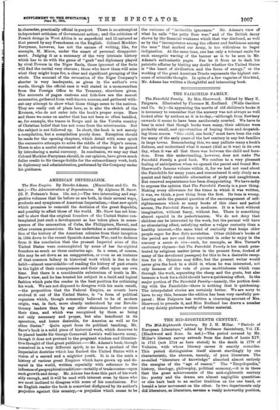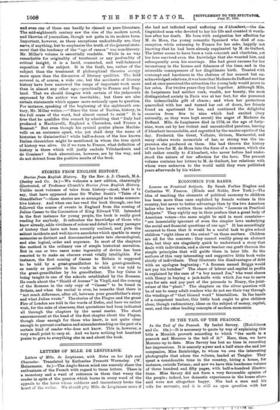THE MID-EIGHTEENTH CENTURY.
The Mid-Eighteenth Century. By J. H. Millar. " Periods of European Literature," edited by Professor Saintabury, Vol. IX. (Blackwood and Sons. 5s. net.)—The period covered by Mr. Millar's literary survey extends from the death of Louis XIV. in 1715 (not 1714 as here stated) to the death in 1778 of Voltaire, with whose literary career it exactly coincides. This period distinguishes itself almost startlingly by one characteristic, the absence, namely, of pure literature. The so-called "literature of knowledge" absorbed almost entirely the energies of the " age of reason." The " Encyclopedia," history, theology, philosophy, political economy,—it is in these that the great achievements of the mid-eighteenth century lie ; poetry and the drama are almost negligible quantities, or else hark back to an earlier tradition on the one hand, or herald a later movement on the other. In two departments only did literature, as literature, assume a really noteworthy position, and even one of these can hardly be classed as pure literature. The mid-eighteenth century saw the rise of the modern novel, and likewise of journalism, though not quite in its modern form. Important, however, as these exceptions undoubtedly are, they serve, if anything, but to emphasise the truth of the 'general state- ment that the tendency of the "age of reason" was non-literary. Mr. Millar's volume is essentially readable. While in no way remarkable for originality of treatment or any profundity of critical insight, it is a lucid, connected, and well-balanced exposition of the subject. It is the fault, too, rather of the subject than the treatment if philosophical theories occupy more space than the discussion of literary qualities. The field covered is, of course, a wide one, but the accidents of literary history have here narrowed the range of important work more than in almost any other age,—practically to France and Eng- land. That we should disagree with certain of the judgments expressed by the author was inevitable; but there are also certain statements which appear more seriously open to question. For instance, speaking of the beginning of the eighteenth cen- tury, Mr. Millar writes :—" Since the time of Tacitus, history, in the full sense of the word, had almost ceased to exist." It is true that he qualifies this remark by admitting that "Italy had produced a Machiavelli, England a Clarendon, and France a Bossuet." But even though his cynical genius places Machia- velli on an eminence apart, who yet shall deny the name of historian to Guicciardini ? while half-a-dozen of the less known Italian chroniclers might be mentioned in whom the true spirit of history was alive. Or if we turn to France, what definition of history is there which will justly exclude Villehardouin and de Comities ? Such aberrations, however, are by the way, and do not detract from the positive merits of the book.























































 Previous page
Previous page